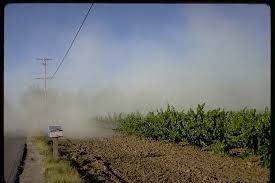30
Oct
Deadline Today: Stop Monsanto from Poisoning Farms and Communities
(Beyond Pesticides, October 30, 2017) Tell the Arkansas State Plant Board to stand up to Monsanto, and protect farmers by banning dicamba’s use in Arkansas agriculture.
 Comment period closes today, Monday, October 30, 2017, at 4:30pm (Eastern Time). Your comments are needed to stop the disaster in Arkansas being created by Monsanto’s new genetically engineered (GE) cropping system, which relies on the toxic pesticide dicamba.
Comment period closes today, Monday, October 30, 2017, at 4:30pm (Eastern Time). Your comments are needed to stop the disaster in Arkansas being created by Monsanto’s new genetically engineered (GE) cropping system, which relies on the toxic pesticide dicamba.
If Arkansas bans dicamba, other states should and will follow —given the chemical industry’s takeover of the U.S. Environmental Protection Agency (EPA), which is allowing this extremely hazardous pesticide use.
This is a problem that has regional and national implications, given the breakdown of the EPA and its pesticide program. We cannot let this failure of protection stand in Arkansas or anywhere in the country.
Promoted by Monsanto as a way to address rampant Roundup (glyphosate) resistance, Monsanto’s new GE soybeans are now able to withstand both glyphosate and dicamba, an older herbicide with a range of documented health effects —from neurotoxicity to reproductive problems.
Dicamba is also highly volatile and, as a result, has drifted across crop fields throughout the region, damaging high value fruit tree and organic operations.
Dicamba drift and damage is pitting farmer against farmer, neighbor against neighbor. Last year, a farmer in Arkansas was shot in a dispute that involved dicamba drift and resulting crop damage. And the University of Arkansas’ agricultural research station saw over 100 acres of soybeans ruined as a result of nearby dicamba use.
Dicamba’s use in GE agriculture perpetuates a toxic, pesticide-dependent system that poisons farmers, farmworkers, and nearby communities, while eliminating habitat for pollinators, contaminating water, and encouraging weed resistance. Because of the success and growth of organic agriculture, there are better ways to grow food without causing crop damage, or putting human health and the environment in harm’s way.
And please follow up with a phone call to 501-225-1598!
For more information on this issue and Dicamba’s hazards see:
New EPA Restrictions of Herbicide Dicamba, Prone to Drift, Criticized as Not Stopping Major Crop Damage
Crops Damaged by Drift Widespread from Herbicide Dicamba Applied to GE Plants
EPA Registers Dicamba for GE Crops, Adding to Growing Herbicide Resistance Issue
Effects of the herbicide dicamba on nontarget plants and pollinator visitation










